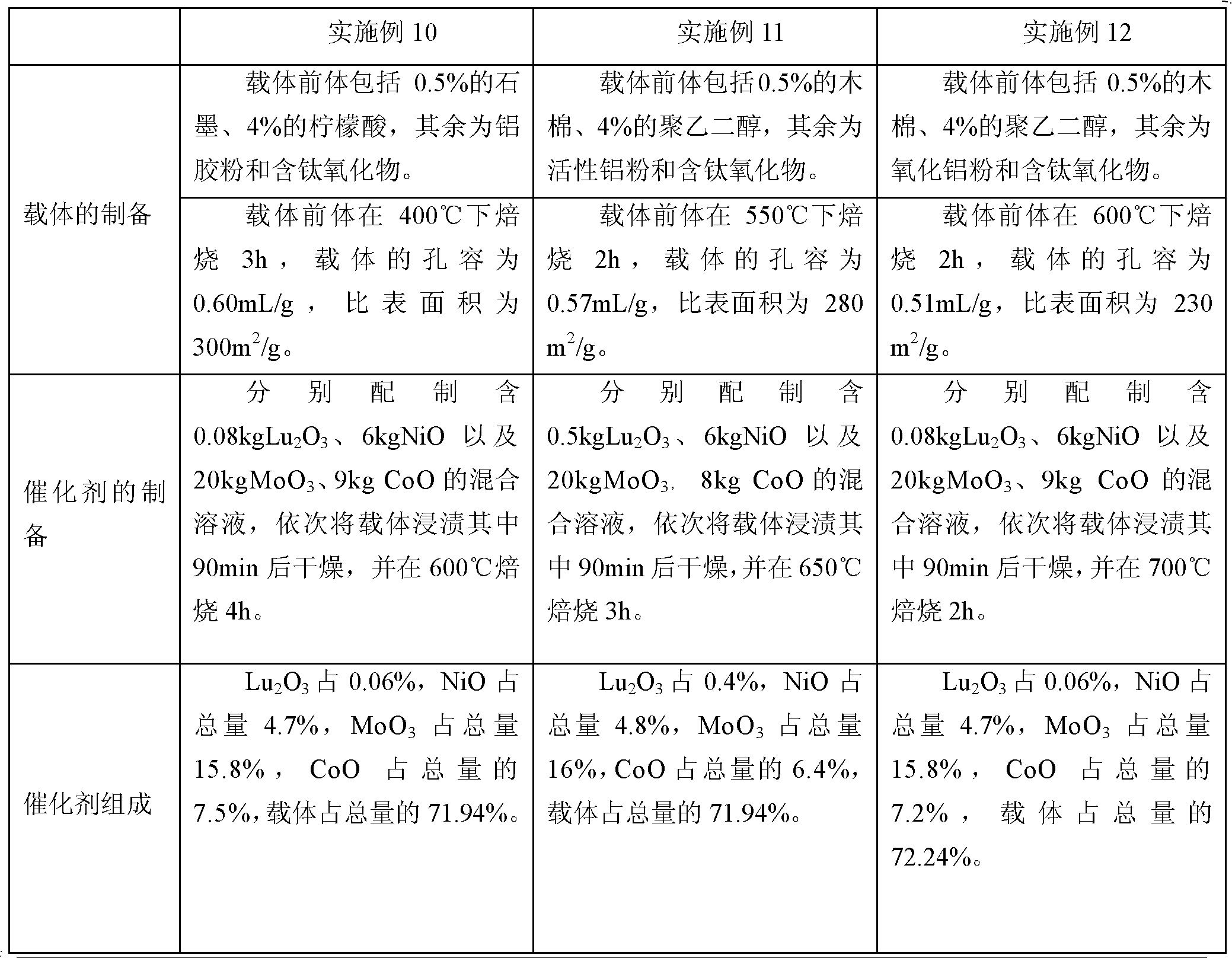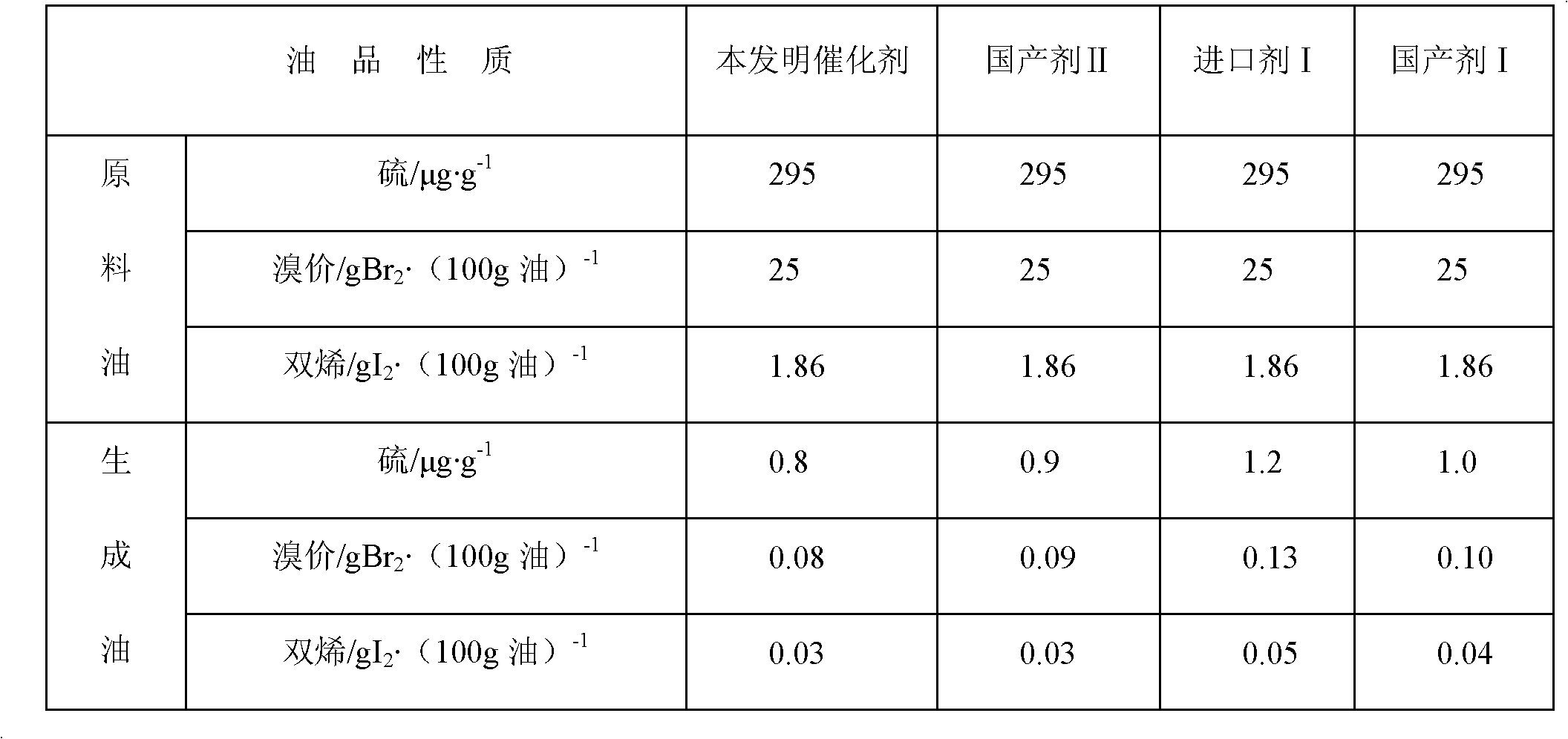Hydrofining catalyst and preparation method thereof
A hydrofining and catalyst technology, applied in chemical instruments and methods, metal/metal oxide/metal hydroxide catalysts, physical/chemical process catalysts, etc. High active temperature and other problems, to achieve the effect of preventing grain fusion and growth, improving heat resistance, and low active temperature
- Summary
- Abstract
- Description
- Claims
- Application Information
AI Technical Summary
Problems solved by technology
Method used
Image
Examples
Embodiment 1
[0027] A hydrorefining catalyst is prepared through the following steps:
[0028] Preparation of the carrier: 72.0kg of modified alumina powder prepared by carbonization, 24.0kg of metatitanic acid, and 1.5kg of hydroxycellulose were mixed and ball-milled to more than 200 mesh, and an appropriate amount of water and 4.0kg of phosphoric acid with a concentration of 52% were added and kneaded. squeeze into clover strips. Drying at 110-120° C. for 3 hours to obtain a carrier precursor. Based on the total amount of the carrier precursor as 100%, hydroxycellulose accounts for 1.5%, phosphoric acid accounts for 2.1%, and the rest is modified alumina powder and titanium-containing oxide prepared by carbonization.
[0029] Then the carrier precursor was calcined at 570° C. for 3 hours to obtain 90.5 kg of carrier. Among them, titanium-containing oxides (TiO 2 ) accounted for 21.7% of the total weight, and γ-alumina accounted for 78.3% of the total weight. The pore volume of the ca...
Embodiment 2
[0033] A hydrorefining catalyst is prepared through the following steps:
[0034] Preparation of the carrier: Mix 72.0kg of modified alumina powder prepared by carbonization, 24.0kg of metatitanic acid, and 4.0kg of scallop powder to a size above 200 mesh, add an appropriate amount of water and 8.0kg of phosphoric acid with a concentration of 52%, knead, squeeze into clover strips. Dry at 110-120° C. for 1 hour to obtain a carrier precursor. Based on 100% of the total weight of the carrier precursor, safflower powder accounts for 3.8%, phosphoric acid accounts for 4%, and the rest is modified alumina powder and titanium-containing oxide prepared by carbonization. .
[0035] The carrier precursor was calcined at 600°C for 3 h to obtain 91.5 kg of titanium-modified γ-alumina carrier, in which titanium oxide (TiO 2 ) accounted for 21.4% of the total weight, and γ-alumina accounted for 78.6% of the total weight. The pore volume of the carrier is 0.45mL / g, and the specific su...
Embodiment 3
[0039] A hydrorefining catalyst is prepared through the following steps:
[0040] Preparation of the carrier: Mix 72.0kg of modified alumina powder prepared by carbonization, 24.0kg of metatitanic acid, and 0.5kg of scallop powder to a size above 200 mesh, add an appropriate amount of water and 5.0kg of nitric acid with a concentration of 65%, knead, squeeze into clover strips. Drying at 110-120° C. for 3 hours to obtain a carrier precursor. Based on the total amount of the carrier precursor as 100%, the scallop powder accounts for 0.5%, nitric acid accounts for 3.3%, and the rest is modified alumina powder and titanium-containing oxide prepared by carbonization.
[0041] Then the carrier precursor was calcined at 570° C. for 3 hours to obtain 90.5 kg of carrier. Among them, titanium-containing oxides (TiO 2 ) accounted for 21.7% of the total weight, and γ-alumina accounted for 78.3% of the total weight. The pore volume of the carrier is 0.55mL / g, and the specific surfac...
PUM
| Property | Measurement | Unit |
|---|---|---|
| specific surface area | aaaaa | aaaaa |
| specific surface area | aaaaa | aaaaa |
| specific surface area | aaaaa | aaaaa |
Abstract
Description
Claims
Application Information
 Login to View More
Login to View More - R&D
- Intellectual Property
- Life Sciences
- Materials
- Tech Scout
- Unparalleled Data Quality
- Higher Quality Content
- 60% Fewer Hallucinations
Browse by: Latest US Patents, China's latest patents, Technical Efficacy Thesaurus, Application Domain, Technology Topic, Popular Technical Reports.
© 2025 PatSnap. All rights reserved.Legal|Privacy policy|Modern Slavery Act Transparency Statement|Sitemap|About US| Contact US: help@patsnap.com



